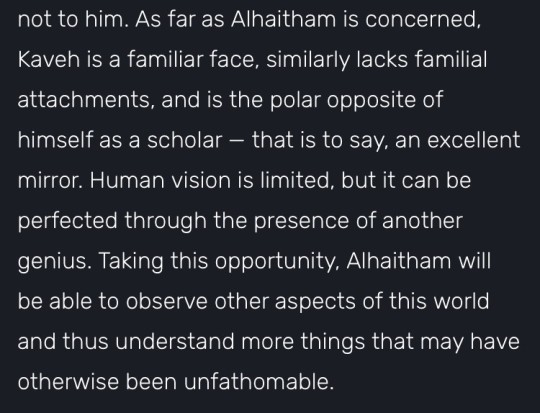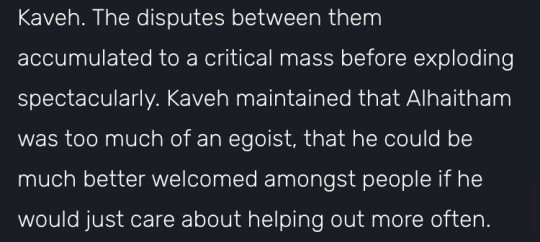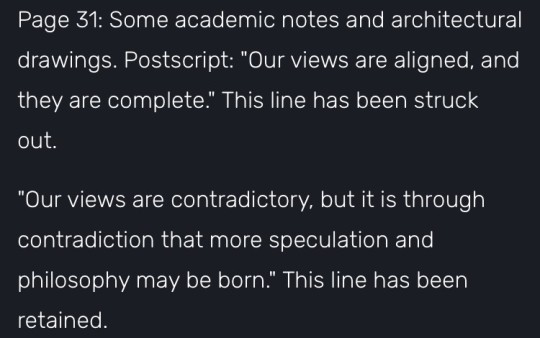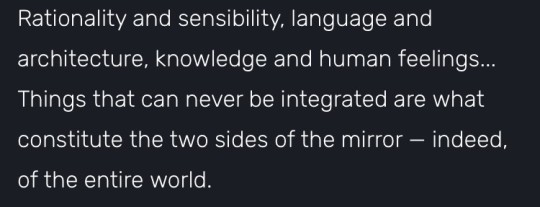#their relationship being PALPABLY improved in cyno's story quest 2 has to be linked to a parade of providence
Explore tagged Tumblr posts
Text
A Parade of Providence haikaveh analysis + predictions
HAPPY ONE YEAR ANNIVERSARY TO A PARADE OF PROVIDENCE!!! <3 as such I thought it would be fitting to talk about a parade of providence and how this affects Alhaitham and Kaveh's relationship in light of Cyno's story quest 2!
Through Alhaitham’s efforts in researching Sachin’s involvement with Kaveh’s father and repeatedly commenting on Kaveh’s internal conflict, it is established in A Parade of Providence that, ultimately, Alhaitham wants betterment for Kaveh – however, this is at odds with his enjoying of Kaveh, as in, Kaveh being a part of his way of life which he seeks to maintain. If he is direct with Kaveh about his intentions, he risks complete rejection, both in Kaveh rejecting him, and in Kaveh rejecting himself.



Thus, it is evident that a new method of understanding one another must be established – and this is demonstrated in the note Alhaitham writes to Kaveh, in a language only the two know. Kaveh is unable to fully comprehend Alhaitham’s meaning, however, due to his misinterpretation of Alhaitham’s character.
As Kaveh views Alhaitham as an egoist who looks down upon his altruism, all of Alhaitham’s words and actions are interpreted through this lens. However, this event has the potential to cause Kaveh to question this. Not only within Kaveh’s uncertainty of Alhaitham’s intentions regarding the meaning of his notes on the idealist denying themselves happiness, but through Alhaitham’s understanding of their relationship.


Alhaitham states to Kaveh that the issue that they disagree over, is not the “correctness” of their philosophies, as Kaveh believes. There is a silence within the text here, which is cause not only for the player to question, but predominantly Kaveh to question. As Kaveh asserts: “What topic of conversation could be more sacred among scholars than… differing philosophies?”, being that their opposing viewpoints are the basis for their interaction, whereas Alhaitham has initiated the interaction due to informing Kaveh on his findings on Sachin: “I didn’t come here for the conversation. Well, not this one at least”.



The basis of this interaction for Alhaitham is a personal interest in Kaveh, whereas Kaveh believes it to be about their conflicting differences. This sentiment, too, is applicable to the standing of their current relationship, where Alhaitham is personally interested in Kaveh’s existence and all that he offers, whereas Kaveh understands Alhaitham to be averse to the conflicts in their natures. For Alhaitham, then, to state that the reason for their disputes not hinging on the “correctness” of their respective philosophies, is an address to Kaveh for him to question what, then, is the reason for their disputes.

Kaveh has understood the contextual clues which Alhaitham has provided, however, his perception of Alhaitham disallows him from fully understanding. He questions Alhaitham’s intentions in writing him the note; he recognises that Sachin’s research into nihilism do not intersect with Alhaitham’s egoism, and therefore, Alhaitham would have no interest in looking into him, and yet, Alhaitham has done so, only to unveil Sachin’s connection with Kaveh’s father. Kaveh thanks Alhaitham for doing so, however, he has seemingly not truly understood why.


Adding to this, if Alhaitham does not keep Kaveh around out of arguing the “correctness” of his egoism, what is Alhaitham’s reason for doing so? This question is posed for Kaveh to recognise and, eventually, answer. By reflecting on his own perception of Alhaitham, Kaveh is closer to understanding Alhaitham’s intentions, and thus, his own betterment – depending on whether he accepts, or rejects, Alhaitham’s concern. Ultimately, it is Kaveh’s choice whether he seeks to absolve himself from guilt, although Alhaitham is integral as a catalyst.

Communication is the key here, as for Kaveh to better understand Alhaitham, Alhaitham must better express himself in order to truly be heard. This links into the core principle of their characters as mirrors; what they lack in themselves is present in the other. With Kaveh being identified as an empath, he believes good communication is the key to mutual trust, and with Alhaitham viewing conversation as a means to an end, the two have conflicting methods of dialogue, and thus, this results in misunderstanding.


For Alhaitham to effectively convey his meaning, he must do so on Kaveh’s terms. However, such methods of conveying goodwill can be counterproductive due to Kaveh’s internal workings, thus, Alhaitham resorts to actions.
By researching into Sachin, despite his initial disinterest, Alhaitham further expands his view on the world, and his objective truth, through the catalyst of sensibility – Kaveh.

His notes on the idealist denying themselves happiness at the risk of losing themselves to these inherently conflicted ideals resonate with Kaveh due to how he cannot assign a negative intention to Alhaitham’s action. By using less derisive language to convey his meaning, along with an empathetic interpretation of Kaveh’s idealist, this contradicts Kaveh’s perspective of Alhaitham as a detached egoist, and therefore, Alhaitham’s meaning is called into question. Sensibility present in actions appears to be an effective way of Kaveh questioning his perspective of Alhaitham, as this meets Kaveh in how he communicates his care of Alhaitham.
It is relevant to discuss that Kaveh held a gathering for his friends after winning the Interdarshan Championship, and in this, also invited Alhaitham, although he was not present due to him being in Aaru Village. Despite this, Kaveh orders dishes to take home for Alhaitham, which Alhaitham notes to the Traveler. These actions convey Kaveh’s thoughtfulness for others, however, it is noted that this is not necessary to do so in Alhaitham’s case, as Kaveh has established a “mutual” dislike between the two of them. This, however, is established due to Alhaitham’s wounding of Kaveh’s pride, as Kaveh’s feelings towards Alhaitham are inherently more conflicted.
Since Kaveh undertakes these actions out of his sensibility, it is relevant to discuss his critiques on Alhaitham’s chosen separation from others. In this event, Kaveh complains about Alhaitham missing out on the gathering in order to find a “hidey-hole to read in”, only to reveal that his complaint serves as cover for concern, when he states: “You need to change your ways, you know. You can’t survive on books alone”.

This aligns with Kaveh’s critique of Alhaitham’s egoism in terms of separating oneself from others in order to better serve oneself, however, here it is a clear indicator of concern, rather than critique. As Kaveh understands meeting with friends as important to one’s livelihood, by Alhaitham avoiding doing so, he believes Alhaitham serves to damage himself. Sensibility, and the ability to value others’ company, to Kaveh is a means of looking after oneself, and Alhaitham denying this, thus, concerns Kaveh.

This demonstrates that the concern the two have for each other does not stem from their belief in the “correctness” of their respective ideologies and enforcing it onto the other, but rather what the other lacks which threatens their development. Both, through their understanding of the world due to the respective philosophies, want to provide what they believe the other lacks in order for the other to be a better realised individual.
The issue, at its core, is not whether they are wrong or right about their beliefs, but rather if their beliefs can benefit the other instead of harming them.
Kaveh’s callback to his initial reaction upon meeting Alhaitham (that, at first, their views “aligned” and were “complete”, being a false judgement, and that instead their differing philosophies could adjourn new speculation (Old Sketchbook) in the line: “What topic of conversation could be more sacred among scholars than… differing philosophies?”, conveys that new speculation can be found in the balancing of their philosophies. Evidently, the idea of ‘balancing’ their philosophies can be seen in their positive influence over each other, in them providing solutions to the other’s problems.


Overall, the question of whether Alhaitham and Kaveh can balance each other out, can maintain a harmony of opposites, exists in the sole premise of their existence: “Rationality and sensibility, language and architecture, knowledge and human feelings... Things that can never be integrated are what constitute the two sides of the mirror”.

Through Kaveh continuing to live with Alhaitham; Alhaitham’s assertion that Kaveh separating himself from the crowd not being a negative in terms of pursuing his ideals; and Alhaitham undertaking different methods of communication for Kaveh to better understand him, A Parade of Providence establishes that both of their fates lie within each other. This creates the promise of a narrative which follows the two reaching a mutual understanding potentially to be explored in future events.
(This is a reworked excerpt taken from my Haikaveh essay posted in March, before Cyno's Story Quest 2! If you're interested you can check it out here or as a pdf <3)
#haikaveh#kavetham#alhaitham#kaveh#their relationship being PALPABLY improved in cyno's story quest 2 has to be linked to a parade of providence#where else did this SOFTNESS come from??#the 1 anniversary of a parade of providence and cyno's story quest 2 being posted on the same day is making me go insane!!#when i get down my thoughts about haikaveh in this quest a parade of providence is going to tie into it i can SMELL it#because they are now at the stage in their development where they are WORKING TOGETHER where that wouldnt have#been possible pre-parade of providence like...#hoyoverse you know what youre doing!! i hate it!!#haikaveh meta#alhaitham x kaveh#kaveh x alhaitham
98 notes
·
View notes